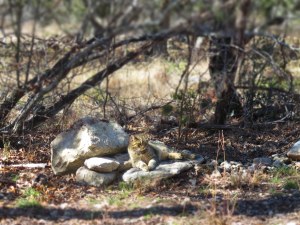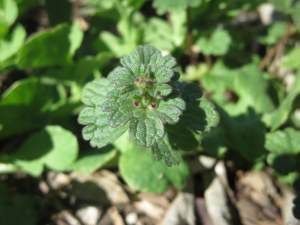Spooky Action Ranch Report: Week Seven 2015
Weeding and Garden Volunteers
Now while we love our people volunteers, what I am talking about this week are visiting plants who pop up in the garden uninvited. This time of year there seem to be an abundance of them, as all the spring flowering plants start getting rooted. The wonderfully mild weather we have been having, combined with a nice amount of moisture has really brought out the volunteers this year. Plucking weeds from the garden can be hard for me because I really enjoy figuring out who is showing up in the garden. I don’t want to boot any volunteers before I know what kind of work they might be doing.
The main image of this post is a beautiful little ‘weed’ known as Persian Seedwell (Veronica Persica). Its a low growing ground cover with adorable tiny blue flowers. It is generally considered a weed since it has no official horticultural use, but I let these volunteers hang around in my herb garden as a natural and pretty cover.
The purple flowered plant at the right is Henbit (Lamium amplexicaule). Here the flowers are not yet fully in bloom. I was delighted to discover this week that the plant is not only a great source of nutrients for our friends the honey bees, it is also fully edible and reported to have a sweet and peppery flavor. I have not given it a try yet. It is an invasive species from the Mediterranean, but with the goal of building a food forest, I am inclined to let these particular volunteers stick around. Looks like they will be really good workers.
Gorgeous Trail Weather

River supervising work on the largest of the fireside campsites, I think we will call it The Fireside Lounge.
I have been taking advantage of the warm and sunny weather to continue work on the ranch trails and campsites. As we begin to fill out the retreat portion of our strategic plan, building secluded campsites, mediation nooks, and lovely trail routes are an important part. We want to help urban artists and creative thinkers to refresh and reconnect with the natural world.
The ranch cats, Zoe and River, often accompany me on my trail work. I can’t really say they help so much as simply supervise, but they are more than welcome.
Water Wars?
There was a major townhall meeting this week hosted by our Texas State Representative Jason Isaac. It was an amazing turn-out. Many citizens are concerned about the future of their water. Out in the hill country, most residents rely upon well water for all of their water needs. That is true for us at the ranch house, although our garden’s thirst is mostly satisfied through rainwater collection.
The water rights laws in Texas are a bit antiquated, and a water pumping company has gotten rights to pump some 5.3 million gallons of water per day out of the Trinity Aquifer, which is the subterranean body of water which serves most of the wells in the county. They are taking advantage of a loophole in the current aquifer regulatory system, which determines the governing regulating body of a pumping system by the combination of surface position and aquifer tapped. In this case they are on land assigned to one aquifer regulator but tapping an aquifer regulated by a different one and end up falling outside any regulator’s current legal authority.
Add to this legal loophole the fact that aquifer science is not really a complete science yet. Don’t misunderstand me, it is certainly a science but what I mean is, there are still a great many unknowns about how our aquifer systems work and what effects our increasing demands on the system will have in the long term.

Jason Isaac hosts a townhall meeting in Wimberley, TX where citizens are concerned about intensive pumping of the Trinity Aquifer by Electro Purification.
It is a pretty complex issue and one that I will be very closely monitoring in the next year. I am grateful that Rep. Isaac has heard the concerns of his constituency and is taking action to learn more about the issue and do what he can to insure sustainable access to water for all. If you want to follow what is happening in this part of Texas, which may end up being a testing ground for future legislation nationwide, check out SaveOurWells.com.
Still, the reality is that as our population steadily grows, the demand we make on our water systems will grow too. It is a free flowing natural resource, and it is finite. There will not be enough of it for all the uses we might put it to from agriculture to industry, from wildlife to human life. I think it is vitally important that we all become conscious of our water use, the water use of the industries (including agriculture) that we support with our consumer choices, and laws governing this precious resource.
A question for the future, ‘Who owns the water?’ I have to wonder, can the water even be owned?

